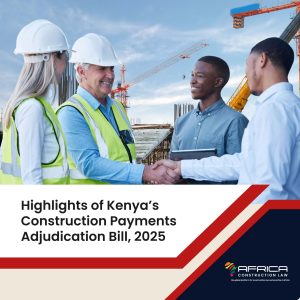[Adjudication, Public Policy, Interpretation, Infrastructure Projects, Standard Form Contracts, New Engineering Contracts (NEC)]
The legal development of enforcing adjudication decisions in South Africa is well recognized with court decisions that spans over a decade.
In 2010, the High Court of South Africa with reference to an adjudicator’s decision issued under the JBCC (a standard form building agreement), confirmed that the parties are bound by the decision of the adjudicator and shall give effect to the decision without delay unless and until the adjudicator’s decision is set aside by an arbitrator (Basil Read (Proprietary) Limited v Regent Devco (Proprietary) Limited (41108/09) [2010] ZAGPJHC 75 (9 March 2010) (saflii.org)).
This set in motion a string of cases that would follow where courts have recognised the purpose of adjudication as to arrive at a speedy resolution of a dispute, which assists with cash flow; is seen as “quick and dirty”; provisional and obliges the parties to implement the adjudicator’s decision until the disputes are finally settled in arbitration.
The South African High Court confirmed these positions in Sasol Chemical Industries Ltd v Odell and Another (401/2014) [2014] ZAFSHC 11 (20 February 2014) (saflii.org)
In Ekurhuleni West College v Segal and Another (1287/2018) [2020] ZASCA 32 (2 April 2020) (saflii.org) the Supreme Court of Appeal (SCA) (one of South Africa’s highest courts) re-affirmed thislaw and placed emphasis on the adjudicator’s powers being determined from their contract, or the underlying contract between the Parties. If a challenge was raised on procedure a party must show that the adjudicator breached an express contractual provision. Vague references to “natural justice” and common law rules of procedural fairness did not apply, as long as the adjudicator followed the contract.
If adjudicators act impartially and within the scope of their powers granted by their relevant contracts(or the underlying contract between the parties), their decisions will be enforced.
A recent trend, however, has developed in South Africa, using the defence of a breach of public policy to over-turn adjudicators‘ decisions.
In Rodpaul Construction (Pty) Ltd t/a Rods Construction v MEC: KwaZulu-Natal Provincial Department of Public Works (599/2023P) [2023] ZAKZPHC 84 (18 August 2023) (saflii.org) the adjudicator in this matter directed the KZN: Department of Public Works, the employer, to make payment to its contractor. The employer’s defence was that the contractor would not be able to repay the amounts if an arbitrator overturned the decision. That would mean a risk that state funds used to pay an adjudication award may not be recovered and that such a risk would render the enforcement of the adjudication award against public policy.
On the facts, the Court found the New Engineering Contract (NEC3) terms are not contrary to public policy. The contract was concluded freely and voluntarily. It was concluded at the request of the employer, who was free to negotiate the terms and amend the standard form terms before it went out to market.
The employer envisaged using public funds to comply with its payment obligations under the contract and that included any dispute that obliged it to pay the contractor. If the employer wanted to stay the enforcement of the adjudication award pending the outcome of the arbitration, it could have but chose not to amend the standard form to do so.
Public policy, for the Court, in fact, dictated that the NEC3 terms must be followed – the parties entered into a contract with a specified regime to resolve disputes, and those terms must be adhered to.
It is imperative to ensure that business and policy objectives are adequately addressed before diving straight into drafting a contract. If interim decisions which facilitate cashflow are not possible, but finality is required before making payment, then do not consider adjudication which is an interim decision.
These chain of cases in South Africa bring legal certainty on the use of adjudication as a tool for resolving disputes. The Courts maintain that adjudications are a well-established and reliable mechanism for resolving disputes. This process has consistently demonstrated its effectiveness in delivering timely, fair, and legally sound resolutions.
The integration of adjudications has significantly enhanced legal certainty for all market participants. By adhering to established legal principles and procedural fairness, adjudications provide clear and enforceable outcomes, ensuring that all parties can operate with confidence and predictability.
This stability and market is crucial for fostering trust, encouraging investment, and promoting the overall growth of the South Africa and African market.
Nikita Lalla, Chief Executive, LnP Beyond Legal, Nikita.Lalla@lnpbeyondlegal.com, Johannesburg, South Africa / Black River, Mauritius
Ricardo Pillay, Director, LnP Beyond Legal, Ricardo.Pillay@lnpbeyondlegal.com, Johannesburg, South Africa


















